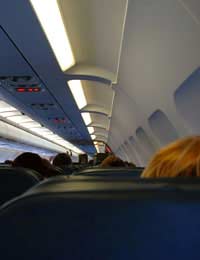Hypnosis and Fear of Flying

Hypnotherapy is a method of treating a variety of both physical and psychological disorders by using the power of the mind to overcome challenges and behaviours.
It uses the principle of suggestion allowing the subconscious mind to communicate with the conscious mind, changing perceptions, beliefs and attitudes of the person.
For hypnotherapy to be effective the person must be willing to co-operate and must really want to overcome their problem. If the treatment works, it can be a very powerful tool and will change the client’s perception and awareness of the disorder from which they are suffering.
How Does Hypnotherapy Help Overcome Aerophobia?
Hypnotherapy is explained as achieving a ‘heightened sense of awareness’ by the processes used, usually by a trained hypnotherapist, who alters the state of consciousness, and then opens up the mind addressing the issues surrounding aerophobia, the origins of the problem and exploring and tackling negative thoughts and images associated with this type of phobia. Once the background and origins of the phobia have been discovered and understood, positive changes can be suggested and implemented.During the assessment stage, the therapist will determine the clients need for the treatment and will discuss aims and outcomes of a full treatment programme, whether this be wanting to enjoy travel, visit a friend abroad, be more comfortable flying or to simply be able to bear a flight.
The person undergoing hypnotherapy will be awake during the treatment and will have a unique and individual experience.A trance-like state is achieved by being talked through tasks and techniques by the hypnotherapist until a deep state of relaxation is achieved.
Following full treatment the aims and goals determined at the assessment stage of the treatment should have been met and the person can be confident that they have regained control of their problem and can confront it without feeling anxiety or distress.
Who Performs The Therapy?
Hypnosis is usually carried out by a trained hypnotherapist who has been professionally trained in the art of hypnosis and only uses approved methods that are known to be safe.Everyday people are able to teach themselves hypnotherapy using a variety of methods such as DVD’s, CD’s or books, which may be a less expensive option, though it is unknown whether these methods of learning will achieve success rates as high as those found by professional therapists. The prices charged by a hypnotherapist vary greatly; a lot of this depends on their reputation and success rate. Costs can typically be between £30 and £60 for a session, and sessions can be from 45 minutes to over an hour. Patients may need only one session or a series of sessions to gain the maximum benefit.
The treatment may be provided at the hypnotherapist’s office/treatment room, or in the patients own home.
It is most important to choose your therapist carefully as potentially anyone can set-up as a hypnotherapist and charge full prices knowing there will be no success. Always check your therapist’s certification and memberships of professional organisations. It may be worth telephoning the organisation and checking that membership exists.
There are a wide variety of self-hypnosis treatment packages available either in the high-street shops or on the internet. The success rate is very dependant on the user's compliance and ability to follow instruction.
Hypnotherapy is not guaranteed to be of benefit to everyone, but it may be worth trying in order to gain some personal control over your phobia, lowering the need for other therapies and medications.
Business Energy With a Difference
If you are looking for business energy or need advanced solutions like remote energy monitoring, new supplies, downgrading or upgrading capacity, have a no obligation chat with Purely Energy.
To find our more get in touch here. or call 0161 521 3400.








